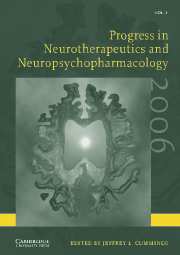Book contents
- Frontmatter
- Contents
- Preface
- Contributors
- Introduction to neurotherapeutics and neuropsychopharmacology
- Rivastigmine in the treatment of dementia associated with Parkinson's disease: a randomized, double-blind, placebo-controlled study
- Modafinil for the treatment of fatigue in multiple sclerosis
- Radiotherapy with concurrent and adjuvant temozolomide: a new standard of care for glioblastoma multiforme
- Treating migraine attacks ASAP: concept and methodological issues
- Early phase trials of minocycline in amyotrophic lateral sclerosis
- Creatine as a potential treatment for amyotrophic lateral sclerosis
- AVP-923 as a novel treatment for pseudobulbar affect in ALS
- Liquid fluoxetine versus placebo for repetitive behaviors in childhood autism
- Testing multiple novel mechanisms for treating schizophrenia in a single trial
- Selegiline in the treatment of negative symptoms of schizophrenia
- Analysis of the cognitive enhancing effects of modafinil in schizophrenia
- Efficacy and tolerability of ziprasidone and olanzapine in acutely ill inpatients with schizophrenia or schizoaffective disorder: results of a double-blind, six-week study, with a six-month, double-blind, continuation phase
- Subject index
- Author index
Rivastigmine in the treatment of dementia associated with Parkinson's disease: a randomized, double-blind, placebo-controlled study
Published online by Cambridge University Press: 22 March 2010
- Frontmatter
- Contents
- Preface
- Contributors
- Introduction to neurotherapeutics and neuropsychopharmacology
- Rivastigmine in the treatment of dementia associated with Parkinson's disease: a randomized, double-blind, placebo-controlled study
- Modafinil for the treatment of fatigue in multiple sclerosis
- Radiotherapy with concurrent and adjuvant temozolomide: a new standard of care for glioblastoma multiforme
- Treating migraine attacks ASAP: concept and methodological issues
- Early phase trials of minocycline in amyotrophic lateral sclerosis
- Creatine as a potential treatment for amyotrophic lateral sclerosis
- AVP-923 as a novel treatment for pseudobulbar affect in ALS
- Liquid fluoxetine versus placebo for repetitive behaviors in childhood autism
- Testing multiple novel mechanisms for treating schizophrenia in a single trial
- Selegiline in the treatment of negative symptoms of schizophrenia
- Analysis of the cognitive enhancing effects of modafinil in schizophrenia
- Efficacy and tolerability of ziprasidone and olanzapine in acutely ill inpatients with schizophrenia or schizoaffective disorder: results of a double-blind, six-week study, with a six-month, double-blind, continuation phase
- Subject index
- Author index
Summary
Key words: Parkinson's disease; clinical trial; rivastigmine; executive function; cholinesterase inhibitor; dementia.
Introduction and Overview
Dementia is common in Parkinson's disease (PD), with an average prevalence of 40% (Cummings, 1988). The clinical phenotype of dementia associated with PD (PDD) is characterized by cognitive slowing, attentional, executive, and visuospatial dysfunction and memory impairment (Emre, 2003). PDD, also shares many clinical and pathological similarities with dementia with Lewy bodies (DLB) (McKeith et al., 2004b).
Extensive Lewy body pathology is seen in the brainstem and neocortex in both DLB and PDD, in some cases with mild degrees of Alzheimer's disease (AD)-type pathology, and there is a pronounced loss of dopaminergic neurons in the substantia nigra (Esri & McShane, 1997). Recent studies using immunohisto-chemical staining techniques for identification of Lewy bodies show that in patients with PD, dementia correlates mostly with the presence of cortical and subcortical Lewy bodies – more so than with AD-like pathological changes (Braak et al., 2005; Apaydin et al., 2002). Lewy bodies are now known to be concomitant in a substantial proportion of AD patients and their presence is associated with faster cognitive and functional decline (Kraybill et al., 2005; Jellinger, 2004). PDD and DLB are associated with marked cholinergic as well as dopaminergic deficits. Cholinergic deficits, which are generally more severe and more widespread than those seen in AD, are the most consistent neurochemical finding associated with cognitive and neuropsychiatric symptoms of both PDD and DLB (Bohen et al., 2003; Tiraboschi et al., 2000; Perry et al., 1985).
- Type
- Chapter
- Information
- Publisher: Cambridge University PressPrint publication year: 2006
- 1
- Cited by



